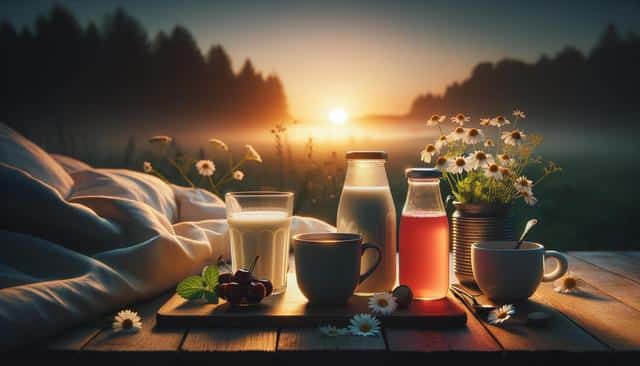Sleep-Friendly Sips: What to Drink and What to Avoid Before Bed
Drinks may help you sleep better if chosen wisely—explore calming options like chamomile tea or warm milk, and learn which beverages like caffeine or alcohol might disrupt rest, helping you build a better nighttime routine naturally.

Soothing Beverages That Support Better Sleep
Choosing the right drink before bed can make a significant difference in how well you sleep. Natural, non-stimulating beverages may help calm the nervous system and prepare your body for rest. Among the most well-regarded options is chamomile tea, known for its calming effects and gentle aroma. Chamomile contains apigenin, an antioxidant that binds to certain receptors in your brain, promoting sleepiness and reducing insomnia. Another popular choice is warm milk, which contains tryptophan—an amino acid that helps the body produce serotonin and melatonin, both essential for quality sleep.
Other helpful drinks include:
- Valerian root tea – Often used as a herbal remedy for anxiety and sleep disorders.
- Tart cherry juice – A natural source of melatonin.
- Almond milk – Contains magnesium, which supports a relaxed nervous system.
These beverages are not only natural but also gentle on the stomach, making them ideal for nighttime consumption. Incorporating them into your evening routine may help signal to your body that it’s time to wind down.
Why Caffeine is a Sleep Disruptor
Caffeine is a well-known stimulant that can significantly interfere with sleep. Found in coffee, many teas, energy drinks, and even chocolate, caffeine blocks adenosine, a chemical that promotes sleep. While the effects of caffeine vary from person to person, its half-life can be up to six hours, meaning that even a mid-afternoon cup can impact your ability to fall asleep at night.
To support better sleep, consider the following tips:
- Avoid caffeine after 2 p.m., especially if you’re sensitive to its effects.
- Switch to decaffeinated or herbal teas in the evening.
- Be aware of hidden sources of caffeine, such as sodas and certain medications.
Reducing caffeine intake in the latter part of the day can help your body start the natural transition toward rest without unnecessary stimulation.
The Impact of Alcohol on Sleep Quality
Although alcohol might make you feel sleepy initially, it actually disrupts sleep architecture. After consuming alcohol, you may fall asleep faster, but the quality of your sleep—particularly REM sleep—can be significantly reduced. This often results in waking up feeling unrested or groggy, despite having spent enough time in bed. Alcohol can also increase the risk of snoring and sleep apnea by relaxing the throat muscles too much.
Here’s how alcohol can interfere with your rest:
- Reduces REM sleep, which is vital for memory and mood regulation.
- Causes frequent awakenings during the night.
- Leads to dehydration, which can disturb sleep later on.
Limiting alcohol intake in the hours before bedtime—or avoiding it altogether—can enhance overall sleep quality and help maintain a stable sleep cycle.
Sugary and Carbonated Drinks: Hidden Sleep Hindrances
Soft drinks, sweetened juices, and other sugary beverages can have a surprising impact on your sleep. High sugar intake before bed may lead to spikes and crashes in blood sugar levels, which can wake you up during the night. Moreover, many carbonated drinks contain caffeine, further complicating sleep efforts. Even beverages labeled as “natural” or “fruit-based” may contain added sugars and stimulants that interfere with your ability to fall and stay asleep.
To minimize disruptions caused by sugary drinks:
- Check labels for hidden sugars and caffeine content.
- Opt for naturally flavored water or herbal infusions in the evening.
- Limit fruit juice intake, especially if it’s processed or sweetened.
Replacing high-sugar beverages with more sleep-friendly options can not only improve your nighttime rest but also support better overall health.
Creating a Relaxing Nighttime Beverage Routine
Establishing a calming drink ritual before bed can reinforce your body’s natural sleep-wake cycle. This doesn’t necessarily mean drinking the same beverage every night, but having a consistent habit can act as a cue for your brain to start winding down. Warm, non-caffeinated drinks sipped slowly in a quiet environment can be particularly effective. Consider dimming the lights, reading a book, or practicing deep breathing while enjoying your evening drink.
Here are a few drink routine ideas to try:
- Herbal tea with a splash of honey in the hour before bed.
- A small glass of warm almond milk while journaling.
- Tart cherry juice while listening to calm music.
By pairing relaxing drinks with other wind-down activities, you can create a personalized routine that supports your sleep hygiene and helps you transition more smoothly into rest.
Conclusion: Supporting Sleep Through Smarter Drink Choices
Making thoughtful choices about what you drink before bed can play a meaningful role in improving your sleep quality. Calming beverages like chamomile tea, tart cherry juice, or warm milk can promote relaxation, while stimulants such as caffeine, alcohol, and sugary sodas can disrupt your rest. Understanding how different drinks affect your body allows you to build a bedtime routine that supports better, more restorative sleep. Whether through herbal infusions or simply reducing caffeine intake, small adjustments in your nighttime beverage habits can lead to noticeable improvements in how refreshed you feel each morning.